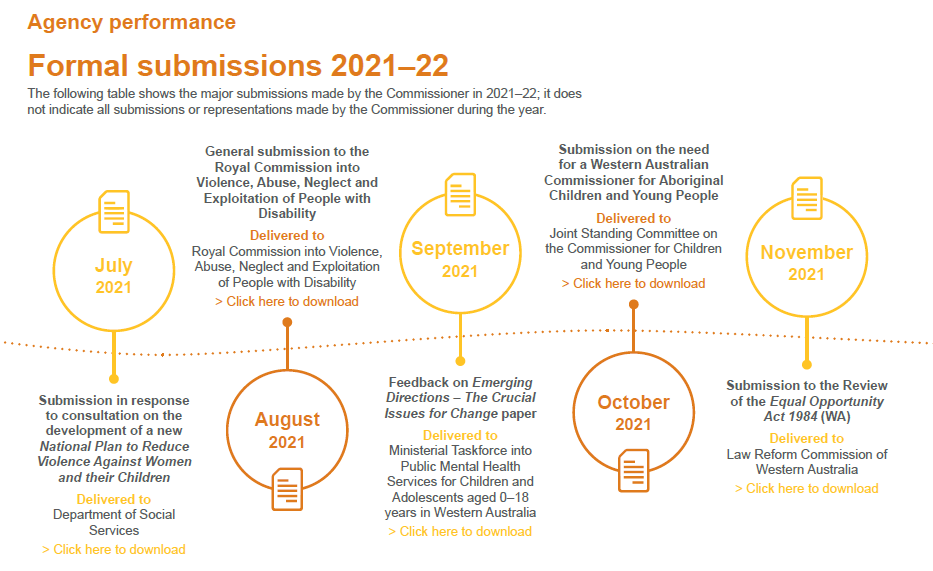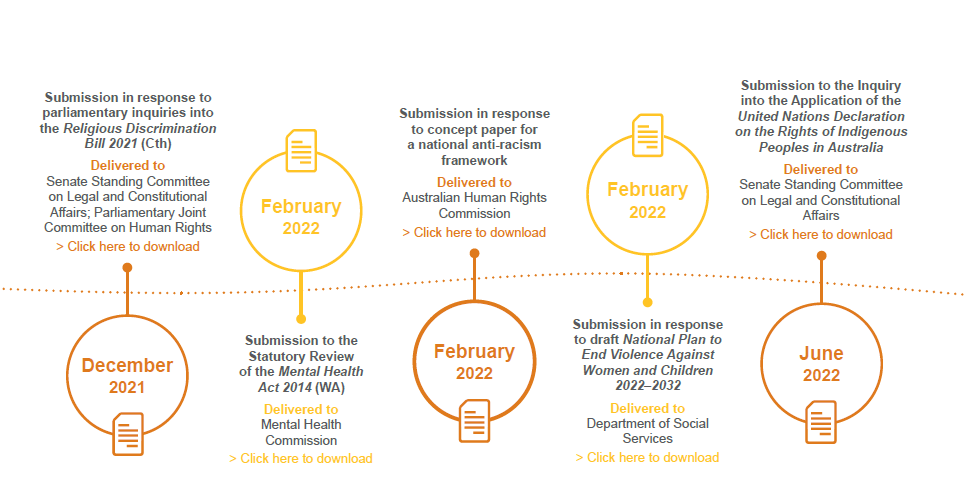Prioritising the needs of disadvantaged and vulnerable children and young people
Prioritising the needs of disadvantaged and vulnerable children and young people
Child poverty
The Commissioner strongly advocates for action to address child poverty in WA. Building on the Commissioner’s 2020 release of the report Child poverty – A call to action, in late 2021 the Commissioner published Missing Out Matters: Child poverty in WA. This report is a collection of essays from WA leaders that examines the effects of poverty on children and young people, and highlights poverty as a critical issue that must be urgently addressed.
It is estimated that up to 17 per cent of WA’s 616,000 children and young people are living in poverty. Collaborative approaches to addressing child poverty are critical. To this end, in late 2021 the Commissioner convened a series of meetings with organisations in WA to discuss joint ways to advocate for systemic change.
In 2022, the Commissioner has continued to engage with a wide range of organisations, raising concerns about child poverty and continuing to advocate for a whole-of-government child and family wellbeing strategy. The Commissioner also provided a submission to the Joint Standing Committee on the Commissioner for Children and Young People inquiry into childhood food insecurity to highlight issues facing vulnerable WA children and young people affected by poverty.
Youth justice
The Commissioner continues to make representations and advocate for changes to the WA youth justice system to improve the opportunities and outcomes for young people in the system and their families.
Throughout the year the Commissioner has received information from various sources raising concern about the safety, stability and engagement of young people in the Banksia Hill Detention Centre (Banksia Hill), and the level of therapeutic care and targeted invention they receive to meet their developmental and rehabilitation needs. In 2021 Commissioner’s team undertook visits across two days within the centre and spoke with nearly 30 children and young people. During another visit the Commissioner’s team joined the Office of the Inspector of Custodial Services on its inspection of Banksia Hill Intensive Support Unit.
Information gained from these visits, and a collation of the voices of young people in Banksia Hill, were used to directly advocate to the Department of Justice.
In 2022 Commissioner McGowan-Jones has continued this advocacy visiting Banksia Hill three times: a meeting with children and young people across different units, including the Intensive Support Unit; a joint visit with other accountability agencies focused on the mental health and wellbeing needs of young people; and a meeting with the Youth Leadership Council.
The Commissioner amplifies the voices of the young people she meets with by directly reflecting their views and concerns in a range of high-level meetings with government and non-government agencies to strongly advocate for improvements at the centre and in adjacent service systems.
The Commissioner also represented the views of young people in the Department of Justice’s consultations about a youth justice strategic plan and a revised model of care for Banksia Hill, while strongly advocating for young people to be directly engaged in these development processes.
To further advocate for children and young people in the youth justice system, the Commissioner facilitated a joint agency visit to Banksia Hill with the National Children’s Commissioner, Anne Hollonds. The purpose of this visit was to inform the National Children’s Commissioner of the issues at Banksia Hill and give her the opportunity to meet with young people at the facility. Being able to witness first-hand the conditions at Banksia Hill enabled the National Children’s Commissioner to be to advocate for improvement and change at a national level.
Through collaborative approaches with other accountability agencies and the Department of Justice, Commissioner McGowan-Jones will maintain a focus on advocating for the rights and wellbeing of young people in Banksia Hill.
Improving outcomes for Aboriginal children and young people
The Commissioner recognises that Aboriginal people are best placed to identify, develop and manage solutions to meet their needs. In 2020–21 the Commissioner developed a program called Young Aboriginal Researchers in Community (YARiC) which was piloted in Wyndham and Roebourne.
In 2022 this program is being facilitated in Kalgoorlie with Aboriginal girls and will further investigate the outcomes identified in the Speaking Out Survey that female young people consistently rate their wellbeing below that of their male peers.
Lotterywest funding allowed us to extend the Speaking Out Survey to reach more Aboriginal children and young people in remote communities. The Commissioner’s office visited an additional 11 schools in the Kimberley, Pilbara and Goldfields regions to pilot a modified version of the Speaking Out Survey questionnaire with Aboriginal students.
The Commissioner also continues to prioritise working collaboratively with government agencies and other stakeholders to advocate for systemic solutions to address the overrepresentation of Aboriginal children and young people in child protection and justice services.
Royal Commission into Institutional Responses to Child Sexual Abuse
December 2022 marks the halfway point of the implementation period of the Royal Commission’s recommendations. The Commissioner engaged KPMG to undertake a rapid review of national progress of the implementation of the 24 recommendations in Volume Six of the Royal Commission’s Final Report (Making Institutions Child Safe).
In October 2021, the review found that two of the 24 recommendations have been completed by all jurisdictions, and 21 had reached varying levels of progress. The review informed the progress update on the implementation of the Royal Commission recommendations made by the Australian and New Zealand Children’s Commissioners and Guardians Group and the Commissioner provided the findings of the rapid review to the WA Government in October 2021.
The Commissioner continues to strongly advocate for governments and leaders to fully implement and resource the recommendations from the Final Report of the Royal Commission into Institutional Responses to Child Sexual Abuse.
Child protection
As recommended by the Royal Commission into Institutional Reponses to Child Sexual Abuse in 2017, the Commissioner continues to advocate for strong independent oversight of the child protection and out-of-home care system.
During the previous reporting period the Commissioner undertook an independent review of the Department of Communities’ policies, practices and services regarding the placement of children with harmful sexual behaviours in residential care.
The Commissioner made six findings and nine recommendations related to the wellbeing of children and young people in residential care. Of the nine recommendations, three were made to the Minister for Child Protection and six to the Department of Communities. The report Independent Review into the Department of Communities’ policies and practices in the placement of children with harmful sexual behaviours in residential care settings containing these findings and recommendations was tabled in the Western Australian Parliament on 15 September 2021.
The WA government response to the report was tabled by the Minister for Child Protection on 11 May 2022, who acknowledged the work undertaken by the Commissioner and his office in completing the review and the courage of the young people involved for sharing their experiences. Of the nine review recommendations eight were accepted by the government and are being progressed, one recommendation was accepted in principle.
The Department of Communities will provide annual progress reports to the Commissioner commencing September 2022 until the delivery of recommendations is satisfied.
Mental health
The views of children and young people collected by the Commissioner’s office through consultations and the Speaking Out Survey demonstrate that their mental health is a serious issue.
The Commissioner actively participated as a member of the Interagency Expert Advisory Group to the Ministerial Taskforce into Public Mental Health Services for Infants, Children and Adolescents aged 0–18 years in Western Australia (ICA Taskforce), as well as in other consultation processes.
These included participating in the development of the implementation plan for the publication Young People’s Mental Health, Alcohol and other Drug Use: Priorities for Action 2020–2025 and in workshops to develop service models for the Youth Step-Up Step-Down Service, Youth Long-term Housing and Support Program, and Youth Psychosocial Packages.
The Commissioner also made several related submissions including to the ICA Taskforce’s Emerging Directions: The Crucial Issues for Change paper and to the statutory review of the Mental Health Act 2014.
The Commissioner will continue to advocate for the rapid implementation of the recommendations of the ICA Taskforce’s final report, particularly those recommendations concerning marginalised children and young people involved with multiple service systems.





